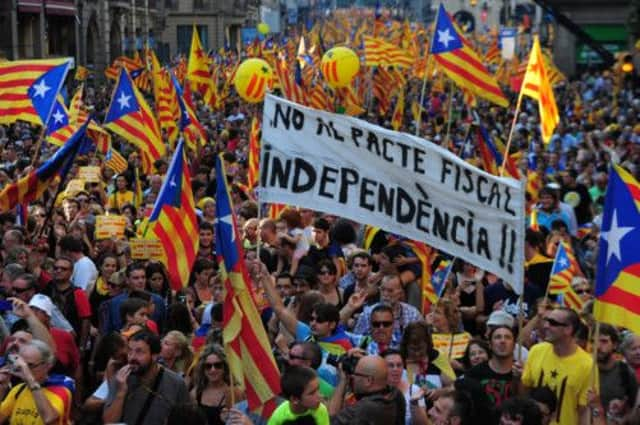Independent Catalonia ‘would see wages fall’


This “best case” assumes that an independent Catalonia would be allowed to stay in the European Union, enjoy an amicable separation from Spain, not suffer a boycott of Catalan products, such as cava, and enjoy a pre-crisis fiscal deficit level.
The study, Possible Economic Costs of a Break with Spain, was compiled by Barcelona-born José Vicente Rodríguez Mora, professor of economics at Edinburgh University. It forms part of a wider report on the cost of independence published by the Unión Progreso y Democracia party.
Advertisement
Hide AdAdvertisement
Hide AdThe argument put forward by those who favour independence is that, as one of the wealthiest Spanish regions, Catalonia contributes far more to central government than it gets back, this “excess” going to subsidise poorer regions. The claim is that if all the wealth created in Catalonia stayed there, this would compensate for any economic deficit brought about by independence. This report refutes that claim.
Mr Rodríguez Mora said that “the argument about fiscal equilibrium is false and ethically despicable. It isn’t even an economic argument. It’s based on the idea of who deserves to be treated as a citizen and who not.”
He said the argument that if Catalonia did not contribute to the centre it would be better off is false because it treats it as though it were happening in a political and economic vacuum.
He added that one of the reasons business is so heavily concentrated in Catalonia and the Basque Country – aside from sea ports and easy access to France and the rest of Europe – is that, compared to the friction between other European states, there is comparatively little friction between these regions and central government. This would not be the case were Catalonia to make a unilateral declaration of independence, which he calls the “frontier effect”.
He argued that if this increased commercial friction were at the same level as that between Spain and Portugal, economically Spain’s nearest neighbour, then Catalonia’s GDP would fall by 3 per cent.
Analysis of independence movements in 100 countries suggests that when a national frontier replaces an internal one, trade between the two falls by around two-thirds, even when the separation is amicable. In the five years after the so-called “velvet divorce” between the Czech Republic and Slovakia, trade fell by three-quarters. Given that Spain is Catalonia’s biggest “export” market (45.7 per cent), the “frontier effect” could have a considerable impact.
France (10 per cent) is its single biggest export market outside Spain, but that is followed by three Spanish regions: Aragón, Valencia and Andalucía.
Critics have pointed out that Mr Rodríguez Mora is a founder member of Ciutadans, a Catalan party that opposes independence.
Advertisement
Hide AdAdvertisement
Hide AdLast year, an analysis by Credit Suisse suggested that, were Catalonia to secede and leave the EU, GDP would fall by as much as 20 per cent, putting it below the wealth level of the rest of Spain.
Unlike Scotland, Catalonia does not have oil, nor whisky. Chemicals and cars produced by multinational firms such as BASF and Volkswagen account for 43 per cent of exports.